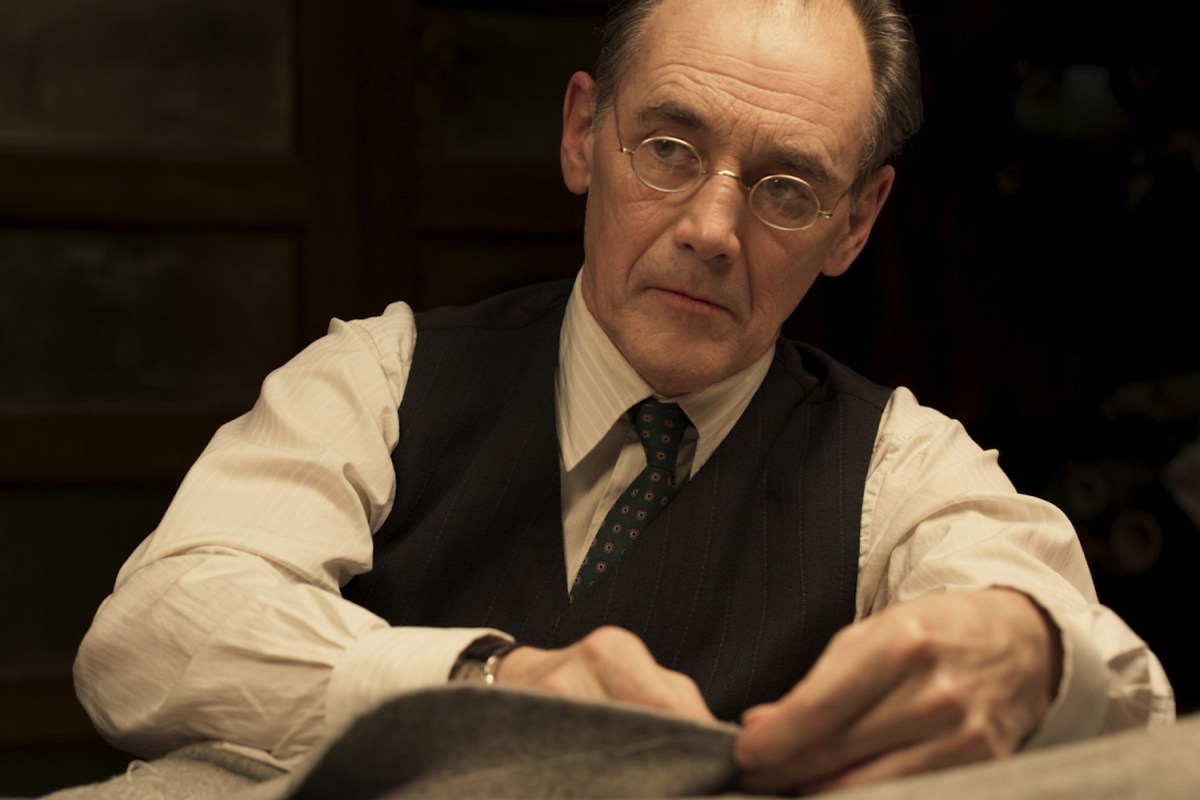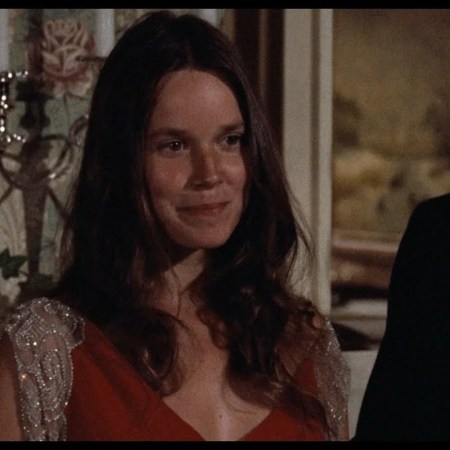Mark Rylance spent a week with the team at Huntsman Savile Row to prepare for his role as Leonard the tailor in the thriller The Outfit. When he arrived he already knew how to sew, but he quickly learned that making a suit was something entirely different.
Sure, he had to learn how to hold the thimble correctly, and the intricacies of the many pieces that make up a perfectly made suit. But he also learned about the experience; in all his years of being fitted for suits, he says he never had felt the way he did in Leonard’s suit. And that depth of appreciation comes across in the film. Rylance considers himself a working class man above all, and sees acting as a craft, not unlike tailoring; something to be studied and honed. He says he’s someone, like his character, who struggles to stop working because it’s so ingrained in who he is as the son of a teacher; and the grandson of a banker.
We had the opportunity to chat with Rylance about The Outfit – a film with the old world charm of classic noirs – that was recently released in theaters. He shared his thoughts on the craft of acting, the gifted writer behind the film’s screenplay, and what kind of clothing makes a man.
InsideHook: What did you think of Leonard, your character, the first time you met him?
Wow. I mean, you meet characters in different ways. I guess you meet them when you read the screenplay and the screenplay was so thrilling. It was just a really great read and I tore through it and I’m a slow read generally. I was more meeting the story and meeting all the other characters as well, but I feel more like I met him when Campbell Carey from Huntsman Savile Row put me in the suit and I got my hair in order and my hat and I walked into his space for the first time. But I walked in with all that technical stuff behind me and saw the whole thing and his life, his lonely life there. And he’s taking recluse in a craft, which certainly at times I’ve used acting that way, and when one’s got some grief or some problem you don’t want to face, that it can actually motivate some beautiful writing or some beautiful play acting. Or in his case, it’s the clothes that he’s making — which obviously, he’s making to a very high standard, high enough for the Chicago special clientele, without wishing to say more.
So I think I met him really around his love for work, and that’s always been something that I, and my dad, and my grandfather shared. We’re definitely working class. I’m a little bit more famous and wealthy than you’d imagine a working class man. But I’m not very good at holidays. I love to work. And I find myself more comfortable with people in a working environment than at a party. I like doing things together with people rather than just standing around doing nothing. I’m not so good at that. I admire it but I’m not so good at it.
That’s how I am too.
You have to balance it out, don’t you? But there you go. So I think I met him when I got to work and made a cup of tea and started to work on that beautiful table. And then I felt he was very much there with me.
And what did you think of him when you met him at that point?
You have to like all the characters you play. That’s what the old timers say, even if you’re playing Richard III or playing some psychopath. Well, maybe it’s more that you just have to be careful about judging characters. The audience judges. You have to be them. They will judge themselves to a greater or lesser degree, but I’m not presenting his character. I’m being him and playing him. And it’d be impossible for me to present him anyway because the editor and the director are going to do what they want to do. They might never use any of the takes on me. They might put someone else’s voice on my face. Who knows what they’re going to do? So you’ve got no point even thinking about that stuff. All you can do really is just enjoy the play acting, the playing and it’s nicer to be playing.
So what did I think of him? I mean, hard. I thought one of the harder characters that I played. By that, I mean hard like a fist, not difficult to play. But like a good tailor with his scissors or a good cutter with his paper, he has a very, very clear sense of where the line is, where you mustn’t cross with your scissors and cut where or you’re going to ruin it and where you mustn’t go that way either.
It’s a shame more men aren’t more precise about their clothes nowadays, frankly. There’s a lovely, relaxed quality to some of the clothing. But geez, Bob Mitchum could look incredibly relaxed but he always looked like he had a great line on him and he knew what hung from his shoulders and what hung from his hips and where it should be tight and where it should be loose. And I’m not such a good dresser myself. I wish I was. But I like that about him and I like that I felt that he could measure not just a man’s body, but a man’s soul and his mind and heart and his propensity to violence. And he had a very precise way of analyzing the people around him quietly.
Tell me about the time you spent on Savile Row learning how to present yourself as a tailor.
I mean, that’s one of the extraordinary benefits is that anytime I’m up in the West End now, I can go drop in if I’m dressed well enough. I can go drop in and say hello to Campbell and to Steve, the tailor down in the basement who, with his wife and his daughter, were all busily sewing and hand sewing buttons and using machine in other places and having to do it quite quickly because of the film schedule. That relationship of the tailors and the cutters, and Campbell was training a young woman to be a cutter too so that was nice. I was able to really sit in and observe both of them working. And they let me do some of the marking and the cutting, the marking with the chalk and on the paper. And it was lovely. It just was an art form. Being around artists is just the best.
The thing that struck me the most is that I’ve been measured many times. I must have been in 80 theater productions and 30 or 40 film so I’ve been measured a lot by people, serious people. I’ve never been measured in the way that Campbell measured me. I mean, he found things to measure that I don’t even know if there was something there or not. I have a lot of funny stories too. But the way he would loop the tape around things. He would get not just straight measurements but curved measurements in terms of the way maybe the material from here around up to my ear or something will work. And so it was a long, long beautiful process of measuring in a lovely room. And then a few weeks later, a week later, the suit was on me. It looked fabulous. I’ve never seen a suit so wonderful on me.
[Campbell would say] No, no. No, no. A few pulls, a few adjusts like this, just him standing back and looking, and it was off me. And it came off me three more times. Three more times as he made tiny little adjustments. And I said, “It looks great, Campbell. What are you doing?” He said, “No. You see, your body is irregular. Everyone’s body is irregular. And I can only really see that when it’s on you.” And the reputation of this place, people pay the money here because the suit, it will fit no one else. It’s going to fit you like a glove. And it’s got that much material inside so if I get fat or thinner, it’s going to last for life, that suit.
And when I stood up in it, when he’d finished it, you have a feeling of being more yourself than you feel in any other clothing because it is like a skin. It’s remarkable. Remarkable thing. I highly recommend it. And it’s a much more ecological way of clothing yourself than fast fashion. There’s no child labor in it. You can have materials that are completely organic with no pesticides. And I hope it’s a thing that might come back amidst all the other things that are going to need to pass away.
I think a lot of times men think that having a bespoke suit made is a daunting process or it’s very difficult. But it’s actually very relaxing. It’s an art. It’s very simplistic. It’s a much easier experience than going into a department store and trying on 10 suits.
You learn a lot. You’re learning about yourself because of the questions they ask you. And you can see that while he’s measuring my body, as you were saying, the conversation, he’s also measuring what kind of pride and vanity does this man have? Is he a humble man? Is he a violent man? Is he a thoughtful man or an emotional man? He’s thinking about all those things.
And it’s a fascinating craft, I mean the shears alone are like 6 pounds!
They’re so heavy. I had bruises here on my hands after days when I’d used them a lot. But the shears are so beautiful and his love for the shears, and Leonard, that’s the one thing he’s brought to Chicago, his shears, so they become a very important thing, as you’ve seen. More tricky was sewing really rapidly. And I like to repair things, as you can see my little sweater here [points to a mended collar.] I like to repair things. I always have liked making things. But to see Campbell stitch a bit, – that’s a very wonderful art, to sew by hand.
In my experience, tailors think about what they do like it’s a craft, it’s a working person’s profession. And it seems like that is sort of how you think about acting; you see yourself as a working person.
Yeah, my grandfather, who was a banker in Hong Kong, my father, who was a teacher in Wisconsin, and me, I mean, I’m now more middle class in terms of my success and wealth, but in my bone, I’m working class. I love to work and I’m not very comfortable when I’m not working. I have an aristocratic friend actually, who married a working class girl and he says, “We’ll always go beside each other because she cannot stop working. It’s not possible. And I can’t start working. It’s not in my bone to work.” [laughing] He does actually work and she does actually love to holiday. But he’s talking about there are things we inherit genetically to do with our love or our dislike of work. And I’m certainly on the side that feel more comfortable with other people when I’m working with them than when I’m lying on a beach with them, much to the sadness of my wife, I’m afraid.
And Leonard is a working class person.
Yeah, I can’t say about the end of the film, give it away, but he’s a working man absolutely. But what a brilliant script, wasn’t it? Not only narratively thrilling, but beautifully poetic. They’re talking about the shears, the use of the shears. It was interesting. There are a few places in the film where I wept in one of the takes. I hadn’t planned to weep, I wasn’t trying to weep, but the things had gone so wrong compared to the plan that my character has, so wrong, that I was overwhelmed with grief at what I was doing and what was happening. And fortunately, they’ve taken those takes out. Those are not the takes they’ve used. They’ve kept him harder, which I think is probably right. But the shears make me think of that. Or even the word outfit.
The writing is brilliant, it really is.
Well, he’s a novelist, first of all, isn’t he, Graham Moore. And then he hit it lucky with the screenplay and now he’s moving into directing and writing, a bit like all the greats who wrote their own screenplay because they were that clever with stories. So I think he’s a remarkable talent and such a nice, polite man and such a really, really good leader of people, both younger people and elder people like myself and Dick Pope, the fantastic Dick Pope. He had a lot of people from Mike Lee’s crew, who make films with Mike Lee, who are very, very strong artists in the costuming and the makeup and stuff, and he gives everyone the same amount of respect and listens to every idea and yet, has a strong, clear sense as a directive of where he needs to go. A sense parallel to Spielberg’s, I think, in terms of having his finger on the pulse of the story. What does the audience need to know? What do they not need to know? Really looking after the audience, which is the thing that struck me when I worked with Spielberg. And Graham has the same thing. Real care for giving the audience a thrilling ride.
This article appeared in an InsideHook newsletter. Sign up for free to get more on travel, wellness, style, drinking, and culture.

























